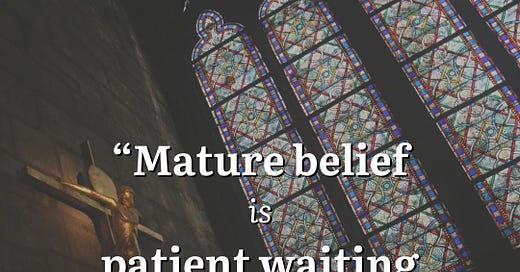“God is good all the time. All the time, God is good.” Except there are times when it doesn’t seem like God is good. Not when I’m walking through the pediatric oncology ward, not when I read news reports of war where innocent civilians are killed, not when I hear the story of a woman in my office discussing her life which began a descent into trouble when she was sexually abused as a child, and not when my memory takes me back to the day when my oldest son took his final breath.
Please understand me. I am not denying the goodness of God and would never do so because I believe God is good. But in life there are times when God seems anything but good.
One of my favorite lines in the Psalter reads, “You kept my eyes from closing; I was too troubled to speak” (Ps 77:4).1 You may understand because you have experienced such troubling times yourself. On any given day I imagine we encounter people who are so troubled that they cannot speak. At least, too troubled to express the pain they are bearing, and perhaps so because they’re not sure if anyone would care to listen. So, with great courage, they put on the mask of a smiling face in order to pretend like all is well when it’s not.
As both a pastor and one who has lived through my own grief and pain, I have tried to be a voice for those who are too troubled to speak. Sometimes I am able to do this, while other times, I am too troubled to speak for myself. But let me give it a try.
God is good and one of the reasons God is good is that he’s big enough to handle our disappointments and doubts as well as our fear and frustrations.
A mature faith, as Tomáš Halík, writes, “takes seriously the human experience of the tragedy and pain” and does so “without belittling it with facile religious comforts.”2 But how can we take seriously the experiences of suffering that others bear if we’re unwilling to listen, be present with them in such grief and pain without trying to counter their anger, bewilderment, and doubts with pious sentiments meant to bolster faith but actually only dismissing the faith expressed by the suffering?
If we want people to trust God in the midst of suffering, then the best thing we can do is create space for them to feel safe in expressing their grief and pain. We create such space by listening without passing judgment or needing to correct anyything said that we might sound somewhat impious. This is a time for empathy, which is a way of carrying the burden of someone else’s suffering (cf. Gal 6:2).
Halík, who I quoted earlier, goes on to say, “Mature belief is patient dwelling in the night of mystery.”3 If we truly have a solid faith in God then we are more than capable of sitting with the disruption of any uncertainty others have. In fact, those who must always assert a statement of faith to someone's doubts in the midst of suffering are probably showing their own lack of faith.
God is good and one of the reasons God is good is that he’s big enough to handle our disappointments and doubts as well as our fear and frustrations. God is big enough because the crucified, resurrected, and exalted Christ in whom God has revealed himself is our assurance. So for the people struggling in your church, in your community, or whoever God entrusts to your presence, listen and give them the space not to be okay, to question God, and to express their doubts as an act of faith. In doing so, God just might work through you to lead someone through the chasm that exists between a faith lingering in despair and a faith renewed in hope.
Unless otherwise noted, all scripture quotations are from The Holy Bible, New International Version, NIV. Copyright © 1973, 1978, 1984, 2011 by Biblica, Inc. Used by permission. All rights reserved worldwide.
Tomáš Halík, Patience with God: The Story of Zacchaeus Continuing In Us, trans. Gerald Turner, New York: Double Day, 2009, 108.
Ibid.




Fantastic definition of empathy K. Rex Butts. I’m saving that in my files.